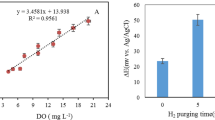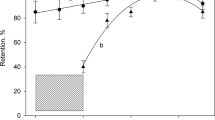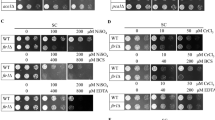Abstract
THE use of bathophenanthroline (4:7-diphenyl-l:10-phenanthroline) as a highly sensitive reagent for the colorimetric estimation of iron has been described by Smith, McCurdy and Diehl1. They showed that it was almost twice as sensitive as 1:10-phenanthroline, that the ferrous-batholphenanthroline complex could be extracted into a suitable solvent, and that it was virtually specific for iron (cobalt formed a yellow non-extractable complex; copper formed a yellow extractable complex, but only in neutral or alkaline solution). In view of these considerations it was decided to use this reagent to replace 1:10-phenanthroline in the estimation of iron in culture medium, and the following method was developed.
This is a preview of subscription content, access via your institution
Access options
Subscribe to this journal
Receive 51 print issues and online access
$199.00 per year
only $3.90 per issue
Buy this article
- Purchase on Springer Link
- Instant access to full article PDF
Prices may be subject to local taxes which are calculated during checkout
Similar content being viewed by others
References
Smith, G. F., McCurdy, W. H., and Diehl, H., Analyst, 77, 418 (1952).
Jones, W. A., Biochem. J., 43, 429 (1948).
Author information
Authors and Affiliations
Rights and permissions
About this article
Cite this article
SEAMER, P. Estimation of µgm. Quantities of Iron in Culture Medium, using Bathophenanthroline. Nature 184, 636–637 (1959). https://doi.org/10.1038/184636a0
Issue Date:
DOI: https://doi.org/10.1038/184636a0
Comments
By submitting a comment you agree to abide by our Terms and Community Guidelines. If you find something abusive or that does not comply with our terms or guidelines please flag it as inappropriate.



